1.James M.Tien, Professor, Past President of IEEE SMC, IEEE Fellow, Academician of America National Academy of Engineering, Dean of College of Engineering at the University of Miami, USA
2.C. L. Philip Chen, Professor, Past President of IEEE SMC, IEEE Fellow, AAAS Fellow, Dean of the Faculty of Science and Technology at the University of Macau, China
3.Dr. Tae Hoon OUM , Professor, Chairman of the Air Transport Research Society (ATRS), UPS Chair Professor at Sauder School of Business, University of British Columbia, Canada
4.Gerhard Wäscher , Professor, Past President of European Association of Operational Research. Chair of Management Science at the Otto-Von-Guericke-University Magdeburg, Germany
5.Zaili Yang ,Professor, Faculty of Engineering and Technology at the school of Maritime and Mechanical Engineering in Liverpool John Moores University (LJMU), UK
6.Martin Dresner, Professor, Chair of the Logistics, Business and Public Policy Department, R.H. Smith School of Business, University of Maryland, USA
7.Lei Ji, Professor, the President of the Fourth and Fifth Chinese Society of Optimization, Overall Planning and Economic Mathematics, Director of the Emergency Management of Specialized Committee in Chinese Society of Optimization, Overall Planning and Economic Mathematics, Professor and Ph. D supervisor in Institute of Policy and Management, CAS.
8.Kecheng Liu, Professor, Chair of Informatics and E-Business at University of Reading, UK. He is the Director of Informatics Research Centre, and Head of School of Business Informatics, Systems and Accounting, Henley Business School.
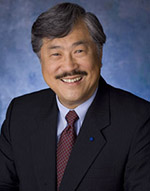
James M. Tien
PhD
DEng (h.c.), NAE
Email: jmtien@miami.edu
Distinguished Professor and Dean, College of Engineering
University of Miami, Coral Gables, Florida
Bio. In 2007, Dr. James M. Tien became a Distinguished Professor and the Dean of the College of Engineering at the University of Miami, Coral Gables, Florida. He received the BEE from Rensselaer Polytechnic Institute (RPI) and the SM, EE and PhD from the Massachusetts Institute of Technology (MIT). He has held leadership positions at Bell Telephone Laboratories, at the Rand Corporation, and at Structured Decisions Corporation (which he co-founded). He joined the Department of Electrical, Computer and Systems Engineering at RPI in 1977, became Acting Chair of the department, joined a unique interdisciplinary Department of Decision Sciences and Engineering Systems as its founding Chair, and twice served as the Acting Dean of Engineering. Dr. Tien has published extensively, been invited to present dozens of plenary lectures, and been honored with both teaching and research awards, including being elected a Fellow in IEEE, INFORMS and AAAS and being a recipient of the IEEE Joseph G. Wohl Outstanding Career Award, the IEEE Major Educational Innovation Award, the IEEE Norbert Wiener Award, the IEEE Richard M. Emberson Award, and the IBM Faculty Award. He received a Doctor of Engineering (honoris causa) from Canada’s University of Waterloo and is also an Honorary Professor at over a dozen non-U.S. universities. Dr. Tien is an elected member of the prestigious U. S. National Academy of Engineering.
After 8 years as Dean of the College of Engineering at the University of Miami, Coral Gables, Florida, Dr. James M. Tien stepped down in 2015; he remains a Distinguished Professor. He received the BEE from Rensselaer Polytechnic Institute (RPI) and the SM, EE and PhD from the Massachusetts Institute of Technology (MIT). He has held leadership positions at Bell Telephone Laboratories, at the Rand Corporation, and at Structured Decisions Corporation (which he co-founded). He joined the Department of Electrical, Computer and Systems Engineering at RPI in 1977, became Acting Chair of the department, joined a unique interdisciplinary Department of Decision Sciences and Engineering Systems as its founding Chair, and twice served as RPI’s Acting Dean of Engineering. Dr. Tien has published extensively, been invited to present dozens of plenary lectures, and been honored with both teaching and research awards, including being elected a Fellow in IEEE, INFORMS and AAAS and being a recipient of the IEEE Joseph G. Wohl Outstanding Career Award, the IEEE Major Educational Innovation Award, the IEEE Norbert Wiener Award, the IEEE Richard M. Emberson Award, and the IBM Faculty Award. He received a Doctor of Engineering (honoris causa) from Canada’s University of Waterloo and is also an Honorary Professor at over a dozen non-U.S. universities. Dr. Tien is also an elected member of the U. S. National Academy of Engineering.
Title:
The Sputnik of Servgoods: Autonomous Vehicles
Abstract:
In an earlier paper [Tien 2015], the author defined the concept of a servgood, which can be thought of as a physical good or product enveloped by a services-oriented layer that makes the good smarter or more adaptable and customizable for a particular use. Adding another layer of physical sensors could then enhance its smartness and intelligence, especially if it were to be connected with each other or with other servgoods through the Internet of Things. Such sensed servgoods are becoming the products of the future. Indeed, autonomous vehicles can be considered the exemplar servgoods of the future; it is about decision informatics and embraces the advanced technologies of sensing (i.e., Big Data), processing (i.e., real-time analytics), reacting (i.e., real-time decision-making), and learning (i.e., deep learning). Since autonomous vehicles constitute a huge quality-of-life disruption, it is also critical to consider its policy impact on privacy and security, regulations and standards, and liability and insurance. Finally, just as the Soviet Union inaugurated the space age on October 4, 1957, with the launch of Sputnik, the first man-made object to orbit the Earth, the U. S. has inaugurated an age of automata or autonomous vehicles that can be considered to be the U. S. Sputnik of servgoods, with the full support of the U. S. government, the U. S. auto industry, the U. S. electronic industry, and the U.S. higher educational enterprise.
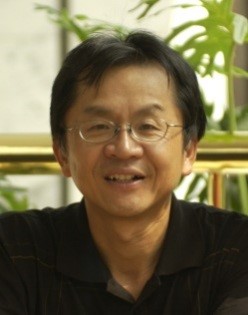
C. L. Philip Chen
Professor, Dean
Jr. Past President of IEEE SMC, IEEE Fellow, AAAS Fellow
University of Macau, Macau, China
CC. L. Philip Chen (S’88–M’88–SM’94–F’07) received the M.S. degree in electrical engineering from the University of Michigan, Ann Arbor, in 1985 and the Ph.D. degree in electrical engineering from Purdue University, West Lafayette, IN, in 1988.
After having worked at U.S. for 23 years as a tenured professor, as a department head and associate dean in two different universities, he is currently the Dean of the Faculty of Science and Technology, University of Macau, Macau, China and a Chair Professor of the Department of Computer and Information Science.
Dr. Chen is a Fellow of the IEEE and the AAAS. He has been the President of IEEE Systems, Man, and Cybernetics Society (2012-2013). Currently, he is the Editor-in-Chief of IEEE Transactions on Systems, Man, and Cybernetics: Systems (2014-) and associate editors of IEEE Access and several IEEE Transactions. He is also the Chair of TC 9.1 Economic and Business Systems of IFAC. His research areas are systems, cybernetics, and computational intelligence. He is also an executive committee member of Chinese Association of Automation, Fellow of CAA and Associate EIC of CAA Communications, a Fellow of Hong Kong Institute of Engineer. A Program Evaluator of ABET (Accreditation Board of Engineering and Technology) in Electrical Engineering, Comp Eng, and Software Engineering.
Title:
Deep learning applications in traffic and transportation
Abstract:
The talk is to discuss recent interesting subject in deep learning technique and its application in traffic flow prediction. Deep learning is a machine learning algorithm that attempt to learn in multiple levels, corresponding to different levels of abstraction. Alternatively, the main advantage of deep learning is about learning multiple levels of representation and abstraction. It is typically used to abstract useful information from data. The levels in these learned statistical models correspond to distinct levels of concepts, where higher-level concepts are defined from lower-level ones, and the same lower level concepts can help to define many higher-level concepts. The concepts can be applied in prediction and decision making in different areas.
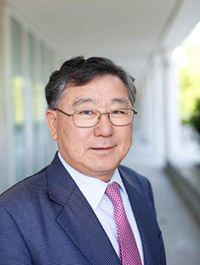
Dr. Tae Hoon OUM
UPS Chair Professor
University of British Columbia, and Chairman-ATRS
Dr. Tae Oum focuses on research and teaching in economics, management strategy and policy analysis in transport/logistics and public utility sectors. He serves on Editorial Boards of twelve international journals including having served as an Editor of Journal of Transport Economics and Policy for 13 years (1998-2011). Also, he has been the founding chair of the ATRS Global Airport Performance benchmarking Task Force report project from its inception in 2002.
He has authored/co-authored 36 books, 130+ refereed journal papers, and numerous reports for international organizations including World Bank, OECD, International Transport Forum, APEC, ICAO and for many government agencies, regulatory commissions and major corporations (Canada, United States, UK, Netherlands, Japan, Korea, Australia, New Zealand, Singapore, Turkey). He has delivered over 350 keynote addresses, invited speeches/seminars, and presentations including two open addresses at the ICAO conferences (2012, 2014).
The honors and distinctions he received include Air Transport News (ATN) Distinguished Career Researcher Awards (2013); the Distinguished Career Research Achievement Award from the (US) Transportation Research Forum (TRF, 2006); Overall Best Paper Prize from the US TRF (2009); The Overall Best Paper Prize from The World Conference on Transport Research Society (1998); Killam Research Prize of Canada-Senior Science Category (2002); Killam Research Fellowship (1988); A Distinguished Fellow of the (US) Transportation & Public Utilities Group (AEA-TPUG) since 2004. He has also been decorated with a Medal of National Order of Merit by the President of Korea (South) in 2005.
Dr. Oum has advised and delivered keynote addresses, invited seminars and executive classes at numerous universities around the world, major international airports (Amsterdam-Schiphol, Seoul-Incheon, Korea Airports Corp, Beijing Capital, Osaka-Kansai, Nagoya-Centrair airports), World Bank, OECD, International Transport Forum, APEC, Transport Canada, Dutch Ministries of Transport and of Economic Affairs, UK Competition Commission, UK Civil Aviation Authority, UK Rail Regulator, AT&T, Australian Consumer and Competition Commission, JR-Central, Air Canada, United Airlines, Northwest Airlines, Japan Airlines, All Nippon Airways, Korean air, Qantas, Virgin Blue, Turkish Airways, etc.
For Canada, Dr. Oum provided experts services to Royal Commission on National Passenger Services on air transport and passenger rail studies (1990-1993), and International Air Policy Task Force (1990s again), CTRC Experts on Long Distance Telecom Deregulation (1991-92). For British Columbia, he served as the Chairman of Korean Market Advisory Group (KMAG) for the Asia Pacific Trade Council for three years (2006-2009) and helped BC Government (under leadership of Premier Gordon Campbell to organize the Open Skies Summit Conference (organizers: three western Premiers of BC, Alberta and Saskachewan) in Sept, 2009.

Prof. Dr. Gerhard Wäscher
Professor and Chair of Management Science
Otto-von-Guericke University
Faculty of Management and Economics
39016 Magdeburg, Germany
eMail: gerhard.waescher@ovgu.de
Vita
Gerhard Wäscher serves as Professor and Chair of Management Science at Otto-von-Guericke University Magdeburg since 2002. He received a PhD in Economic Sciences from Ruhr-University Bochum in 1981 and his Habilitation from the University of Stuttgart in 1990. Before he moved to Magdeburg, he has held positions of a full professor of management at the universities of Heidelberg (1990/91), Braunschweig (1991-1995) and Halle (1995-2002). He has also held guest professorships or visiting appointments at the University of Vienna, the University of St. Gallen, Tong-Ji University Shanghai, Monash University Melbourne, Macquarie University Sydney and others. In 2015, he was appointed as a permanent guest professor and adjunct professor by Beijing Jiaotong University.
Prof. Wäscher has (co-)authored five monographs more than 50 papers and (co-)edited more than 15 special issues of scientific journals or conference proceedings. He has also served and is still serving on the editorial boards of renowned international journals, e.g. the European Journal of Operational Research, OR Spectrum, Central European Journal of Operations Research and Business Research. His current research interests refer to the development and application of quantitative approaches to management problems in production and logistics management. In this field he has also been involved in various consulting projects for organizations in industry and administration.
Professionally, Prof. Wäscher has been a member of the Executive Committee of EURO – The Association of European Operational Research Societies for nine years, of which he served as its President in 2013 and 2014. From 2003 to 2006, he was also Chairman of the Executive Committee of GOR, the German Operations Research Society.
Title
Order picking – A critical function in supply chain management
Abstract
Order picking is a warehouse function which deals with the retrieval of items from their storage location in order to satisfy a certain given demand. It arises because incoming articles are received and stored in (large-volume) unit loads while (internal or external) customers order small volumes (less-than-unit loads) of different articles. Order picking is critical for managing supply chains efficiently, since underperformance results in an unsatisfactory customer service (long processing and de-livery times, incorrect shipments) and high costs (labor cost, cost of additional and/or emergency shipments).
In this presentation, the author will give an overview of planning problems and corresponding methods for the reduction of cost and the improvement of customer service in picker-to-product systems. In particular, the following central planning issues will be addressed: Item location, order batching, and picker routing.
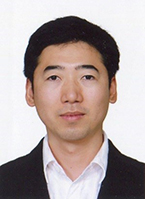
Zaili Yang
Professor
Liverpool John Moores University (LJMU),UK
Zaili Yang is Professor of Maritime Transport at Liverpool John Moores University (LJMU), UK. Prior to his current appointment, he was Reader in Maritime Transport (2010-2014) and a lecturer in Maritime Operations (2007-2010) at the School of Engineering, Technology and Maritime Operations, LJMU. He received his BEng in Maritime Transportation from Dalian Maritime University, China, in 2001, MSc in International Transport from Cardiff University, UK, in 2003, and PhD in Maritime Safety from LJMU, UK, in 2006.
Prof. Yang’s research interests are system safety, security and risk based decision making modelling, especially their applications in marine and supply chain systems. Prof. Yang has conducted more than 20 externally funded projects from the EU, UK EPSRC and UK TSB and DTI to support his research. Research funding support has also been received from government collaborators (i.e. UK MoD and Korean research collaborative funds) via PhD research projects. Prof. Yang has successfully completed 4 postdoctoral and 15 PhD projects. He currently has 2 postdoctoral and 11 PhD students under his supervision in the research areas of maritime safety, logistics operations and port optimisation. His research findings have been published in more than 150 technical papers in risk and supply chain areas, including 60 refereed journal papers. Prof. Yang is a member of editorial boards of seven international journals such as IMA Journal of Management Mathematics and Journal of Traffic and Transportation Engineering and (co)editor of four special issues on journals such as Transportation Research Part D and Part E. He has also served as a member of review boards for national research councils of countries such as Norway and USA. He is a Fellow of Institute of Maritime Engineering, Science and Technology (IMarEST) and a Member of International Association of Maritime Economics.
Title
Resilience and Sustainability of Container Supply Chains – a risk analysis perspective
Abstract
Risk research represents an important challenge for the resilience and sustainability of container supply chains (CSCs) due to climate change, terrorism threats and an increasing amount of economic upheaval in the past decade. Its foci are being expanded from classical safety, through security to climate adaptation areas. Addressing risks of different features requires integration across disciplines and across research methodologies. Currently, we lack the critical understanding of which kinds of risk schemes can most effectively harness science and technology for achieving long-term resilient and sustainable CSCs. This work aims at introducing a novel total risk management programme which enables the quantification, integration and communication of risk information from different areas and facilitates the movement of risk culture from a traditional reactive single dimensional scheme towards a new proactive multiple dimensional regime. The presentation is then followed by detailed risk analysis work in two research streams: 1) maritime security resilience assessment and 2) port adaptation to climate change. The work will address the significant methodological issues associated with resilience and sustainability sciences particularly with reference to risk analysis under high uncertainty.
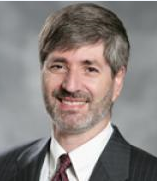
Martin Dresner Professor
Email: mdresner@rhsmith.umd.edu
Professor and Chair of the Logistics, Business and Public Policy Department, R.H. Smith School of Business at the University of Maryland
Martin Dresner has served on the faculty of the R.H. Smith School of Business at the University of Maryland since 1988, where he is currently Professor and Chair of the Logistics, Business and Public Policy Department. He received his Ph.D. in Policy Analysis from the Sauder School of Business at the University of British Columbia. Dresner’s research focuses on two broad areas, air transport policy and logistics management. He has published over 75 papers in refereed journals. Professionally, he is President of the Air Transport Research Society (ATRS), an academic organization devoted to research in the aviation industry. In addition, Dresner is on the Scientific and Steering Committees of the World Conference on Transportation Research. Dresner is immediate past editor of Research in Transportation Economics and a former editor of Transportation Journal. He sits on the editorial boards of several journals in the transportation, logistics and supply chain fields. Dresner is a former president of the Transportation and Public Utilities Group (TPUG) of the Allied Social Sciences Association, and of the Transportation Research Forum (TRF). He has testified before the U.S. House Aviation Subcommittee, and has worked on consulting projects for a number of organizations, including the Maryland Aviation Administration, the Federal Aviation Administration and the U.S. Department of Energy.
Title
Logistics Consideration in International Trade
Abstract:
Over the past several decades, there has been a substantial increase in international trade. Firms have increasingly sourced products from foreign countries and expanded their sales into foreign markets. However, increased trade has important implications for firm performance, largely due to longer and more complex supply chains. The results of two papers are presented that highlight how increased international operations impact a key cost center for many manufacturing firms, notably inventory costs. A greater reliance on imports and exports is found to be associated with higher inventory levels. However, further findings show that the establishment of operations in emerging markets may also lead to improved performance.
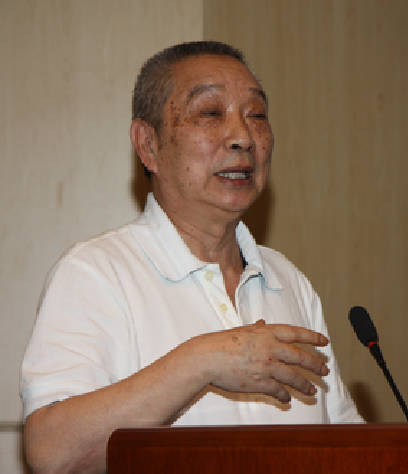
Lei Ji, Professor, the President of the Fourth and Fifth Chinese Society of Optimization, Overall Planning and Economic Mathematics, Director of the Emergency Management of Specialized Committee in Chinese Society of Optimization, Overall Planning and Economic Mathematics, Professor and Ph. D supervisor in Institute of Policy and Management, CAS. From 1965 to 1985, he was one of the assistants of Professor Luogeng Hua, a famous mathematician in our country, in the field of application orientation research.
During 1960s, his research interesting include the theory and applications of Optimization and Overall Planning. In 1980s, he applied Optimization and Overall Planning to decision theory and proposed models and methods of project systems analysis for the state's major projects and development project, which greatly improved the level of decision analysis and decision making. In 1990s, he spent major of his time in Chinese Society of Optimization, Overall Planning and Economic Mathematics and had great contribution to the society.
Recent years, professor Lei Ji led a multi-disciplinary research team to study the applications of the theory on data mining, evaluation, diagnosis, optimization on dynamic resource allocation in industries such as finance, civil aviation, electric power etc.
Since 2003, professor Lei Ji engaged in the research on theory and applications of emergency management. He advocate and organize the Emergency Management of Specialized Committee in Chinese Society of Optimization, Overall Planning and Economic Mathematics. He put forward a new research direction of dynamic game of network technology and published a book emergency management (the book was published in 2006 by Higher Education Publishing House, and was selected as a textbook in the Graduate University of Chinese Academy of Sciences). His research group has done many works on the theory and applications of public safety and safety management. The research topics include emergency management system, emergency plan management, resource allocation and layout, scheduling, and applications of emergency management in practice. Recently, his group devoted themselves to solve the safety problem faced by civil aviation enterprises, developed a theoretic framework, some mathematical models and quantitative analysis methods to analyze the accidents occurring production, accident symptom and unsafe events. These works laid foundation for scientific and effective management of safety production. Their research has been applied gradually in a civil aviation enterprise.

Dr. Kecheng Liu, Fellow of British Computer Society, is a full professor and holds a chair of Informatics and E-Business at University of Reading, UK. He is the Director of Informatics Research Centre, and Head of School of Business Informatics, Systems and Accounting, Henley Business School. He has published over 180 papers in conferences and journals. His research interests span from organisational semiotics, requirements studies, enterprise information systems management and engineering, business processing modelling, alignment of business and IT strategies, co-design of business and IT systems, pervasive informatics and intelligent spaces for working and living. He serves in several journal editorial boards, and guest edited special issues. His research monograph on Semiotics in Information Systems Engineering (2000 Cambridge University Press), is one of the first treating the topic in a systematic manner and has been widely cited.
He was visiting Professor at Southeast University, Fudan University, Beijing Jiaotong University, Dalian University of Technology, Shanghai University of Finance and Economics, Beijing Institute of Technology and the Graduate School of Chinese Academy of Science (all in China), Santiago University of Chile, and officially appointed PhD supervisor in Beijing Institute of Technology. He is member of Senior Board of IBG (British Intelligent Buildings Group) and senior advisor on digital hospitals in a governmental healthcare organisation in China.


- Paper Submission:
15 March, 2016
1 April, 2016 - Authors Notification:
1 April, 2016
15 April, 2016 - Final Paper Submission:
1 May, 2016
30 May, 2016 - Conference Open: 24-27 July, 2016
 For more conference information,
For more conference information,please scan the Wechat code

